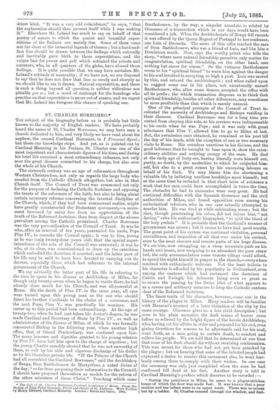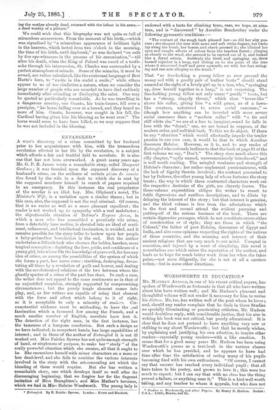ST. CHARLES BORROMEO..
THE subject of the biography before us is probably but little known to the majority of English readers. We have probably heard the name of St. Charles Borromeo, we may have seen a church dedicated to him, and very likely we have read about his nephew, the second Cardinal Borromeo, in I Promessi Sposi ; but there our knowledge stops. And yet, as is pointed out by Cardinal Manning in his Preface, St. Charles was one of the most important and characteristic figures of his time, and during his brief life exercised a most extraordinary influence, not only over the great diocese committed to his charge, but also over the whole of his Church.
The sixteenth century was an age of reformation throughout Western Christendom, not only as regards the large body who seceded from the Catholic Church altogether, but also in that Church itself. The Council of Trent was summoned not only for the purpose of declaring the Catholic doctrines and opposing the tenets of the reformers of the faith, but also to bring about certain necessary reforms concerning the internal discipline of the Church, which, if they had been commenced earlier, might have greatly counteracted the Protestant movement,—a move- ment favoured by many less from an appreciation of the truth of the Reformed doctrines, than from disgust at the abuses prevalent among the Catholic priesthood. Charles Borromeo was the very personification of the Council of Trent. It was he who, after an interval of ten years, persuaded his uncle, Pope Pins IV., to convoke the Council again; it was to him, young as he was (only twenty-four years old), that the special super- intendence of the acts of the Council was entrusted; it was he who, at its close, was commissioned to draw up the catechism which embodied the doctrines it asserted; and the latter part of his life may be said to have been devoted to carrying out its decrees, especially those which had reference to the internal government of the Church.
We say advisedly the latter part of his life in referring to the time he spent in his diocese as Archbishop of Milan, for though only twenty-seven when he began to reside there, he had already done much for his Church, and was all-powerful at Rome. On the death of Pius IV. in the same year, all eyes were turned upon this young man as the one who should direct his brother Cardinals to the choice of a successor, and the next Pope, Pius V., was practically his nominee. His career up to this period had been extraordinary. At the age of twenty-two, when he had just taken his doctor's degree, he was made Cardinal and Secretary of State by Pius IV., as well as administrator of the diocese of Milan, of which he was formally consecrated Bishop in the following year, when another high office, that of Grand Penitentiary, was conferred upon him. The many honours and dignities granted to his young relation by Pius IV. have laid him open to the charge of nepotism ; but the young Charles speedily showed that he was not unworthy of them, as well by his able and vigorous discharge of his duties as by his blameless private life. "If the Princes of the Church had all resembled the Cardinal Borromeo," said the Archbishop of Braga, Dom Bartholomew de Martyribns, a noted divine of the day, "so far from proposing their reformation to the Council, I should have proposed themselves as models for the reform of the other ministers of Jesus Christ." Touching which same
* The Life of St. Charles Borromeo, Cardinal Archbishop of Mika. From the Italian of John Peter Giessen°, Priest and Oblate of St. Ambrose. With Preface by Henry Edward, Cardinal Manning. London : Berns and Oates. 1884.
Bartholomew, by the way, a singular anecdote is related by Giussano of a transaction which in our days would have been considered a job. When the Archbishopric of Braga fell vacant, it was offered by the Queen Regent of Portugal to her confessor, one Luis of Grenada. The news of this offer reached the ears of Dom Bartholomew, who was a friend of Luis, and like him a Dominican monk. Now, says the worthy priest who tells the story, "where mere natural friendship perceives only matter for congratulation, spiritual friendship, on the other hand, sees nothing but cause for alarm." So the virtuous Bartholomew wrote to his "spiritual friend" to warn him against the danger to his soul involved in accepting so high a post. Luis was moved by this, and refused the archbishopric ; and when called upon to suggest some one in his place, not unnaturally named Bartholomew, who, after some demur, accepted the office with all its perils ; the which transaction disposes us to think that spiritual friendship, besides all other differences, may sometimes be more profitable than that which is merely natural.
One of the principal precepts of the Council of Trent in- culcated the necessity of Archbishops and Bishops residing in their dioceses. Cardinal Borromeo was for a long time pre- vented from obeying this rule, as his services were indispensable to his uncle when he was Pope ; and it was only with great reluctance that Pius V. allowed him to go to Milan at last. But, the permission once obtained, he remained at his post till the day of his death, with the exception of one or two necessary visits to Rome. His ceaseless exertions in his diocese, and the good influence that he brought to bear upon it, show the extra- ordinary abilities and untiring energy of the man. He died at the early age of forty-six, having literally worn himself out, partly, no doubt, by the austerities to which he subjected him- self, but also to a great extent by his unceasing labours on behalf of his flock. We may blame him for shortening a valuable life by inflicting needless hardships upon himself; but at the same time he included in that short term of existence a work that few men could have accomplished in twice the time, The obstacles he had to encounter were very great. He had continual difficulties with the Spanish Governor and the civil authorities of Milan, and found opposition even among his ecclesiastical inferiors, who in one case actually attempted to murder him. He was fired at while celebrating mass ; but the shot, though penetrating his robes, did not injure him, "not daring," cries his enthusiastic biographer, "to spill the blood of the holy prelate." It is probable that the Cardinal's manner of government was severe ; but it seems to have had good results. The great point of his system was continual visitation, personal surveillance, and inspection of all that was under his control, even to the most obscure and remote parts of his huge diocese. We see him, now struggling up a steep mountain-path on his hands and knees, now resigning to an attendant the poor straw bed, the only accommodation some remote village could afford, to spend the night himself in prayer in the church,—everywhere received with enthusiastic welcome. Not the least tribute to his character is afforded by his popularity in Switzerland, even among the cantons which had embraced the doctrines of Calvin and Zwingli, his influence being even so great as to secure the passing by the Swiss Diet of what appears to us a severe and arbitrary measure to keep the Catholic cantons clear of the Reformed doctrines.
The finest traits of his character, however, come out in the history of the plague in Milan. Many readers will be familiar with Manzoni's account of a later visitation of the city by the same scourge. Giussano gives us a less vivid description ; but even in his plain narrative the dark scenes of horror come before us relieved by the bright figure of the heroic Archbishop, who, having set his affairs in order and prepared for his end, even giving directions for masses to be afterwards said for his soul, went forth, as a man going to certain death, to comfort and relieve his people. We are told that he determined at one time that none of his flock should die without receiving confirmation. This was meant for those who had not yet been attacked by the plague; but on hearing that some of the infected people had expressed a desire to receive this sacrament also, he went fear- lessly among them to comply with their wishes. In one case the ceremony was only just completed when the man he had confirmed fell dead at his feet. Another story is told in Cardinal Manning's preface which deserves to be recorded :—
"During the pestilence in Milan, he came to a plague-stricken house of which the door was made fast. It was known that a poor mother and her infant were in an upper room. There was no access bat by a ladder. St. Charles entered through the window, and find-
lug the mother already dead, returned with the infant in his arms,— a deed worthy of a picture."
We could wish that this biography was not quite so full of miraculous occurrences. From the moment of his birth,—which was signalised by "a miraculous appearance of brilliant light in the heavens, which lasted from two o'clock in the morning, the time of his birth, until daybreak," as was declared "on oath by five eye-witnesses in the process of his canonisation,"—till after his death, when the King of Poland was cured of a tooth- ache through his intercession, St. Charles was surrounded by a perfect atmosphere of miracle. Some of the miracles, it must be owned, are rather calculated, like the exuberant language of Bret Harte's hero, to "excite in the sinful a smile ;" while others appear to us of too vindictive a nature, when we consider the large number of people who are recorded to have died suddenly immediately after offending or disobeying the saint. One may be quoted as particularly remarkable. As he was travelling in a dangerous country, one Omato, his train-bearer, fell over a precipice, "his horse falling over at a bound, and they heard no more of him. Omato, however, was caught in his fall, the Cardinal having given him his blessing as he went over." The horse would seem to have been killed, so we may suppose that he was not included in the blessing.



































 Previous page
Previous page